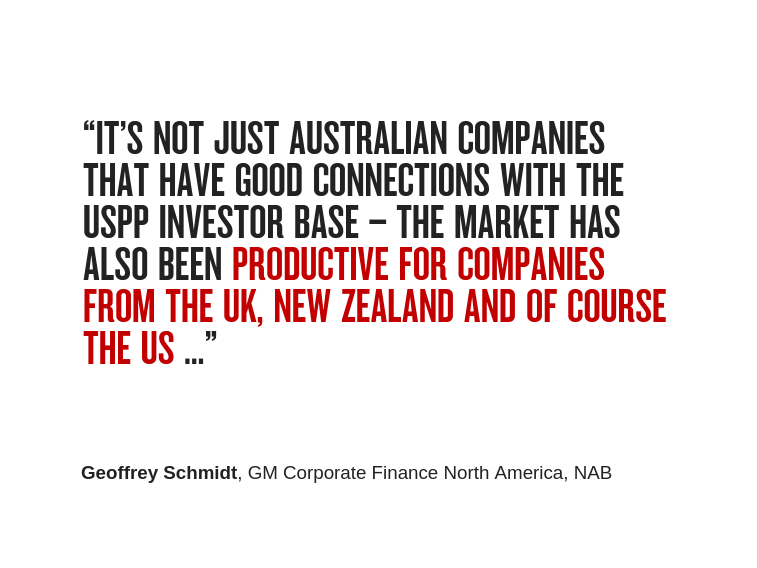We expect NAB’s Non-rural Commodity Price Index to fall by 4.9% in Q2


Insight
US private placements to stay a step ahead of the funding options pack for Australian corporate borrowers

The US private placement (USPP) market might not be the most familiar to a wider audience but it has been a crucial source of debt funds for Australian corporate borrowers for many years.
After another bumper year for Australian-origin supply in 2018, Geoffrey Schmidt, NAB’s General Manager, Corporate Finance North America, highlights some key trends for the year ahead.
The fact that there’s lots of money looking for a limited supply of assets is a well established phenomenon across global credit markets. But it’s particularly noticeable in USPP – which is a big positive for corporate borrowers.
For the past decade, investment markets have reverted to a more vanilla style with less financial engineering and therefore less supply of product. This means investors are competing to get the exposures they want.
In the USPP space, we’ve seen market entrants on the investor side and thus a much deeper bid pool. In effect, demand has increased quickly while supply has increased more slowly. This dynamic makes pricing more appealing to borrowers.
There’s no shortage of uncertainty in the US at the moment, but at the same time the insurance companies that form the bulk of the USPP buyer base continue to accumulate assets. This means potentially lower domestic issuance growth but no let-up in the accumulation of capital that needs investing.
Historically, USPPs almost invariably offered coupons about 0.35% greater than deals done in the public market – you could set your watch by it. This margin has got progressively smaller and smaller thanks to supply-demand dynamics, and at the start of 2019, USPP investors are often prepared to pay more than bond trading levels in public markets to secure access to rare issuers.
One of the biggest revelations we had in 2018 came from a deal we arranged for Sydney Airport. USPP investors were prepared to offer an issuer 20-, 25- and 30-year debt, denominated in Australian dollars, in order to get access to an issuer name they favoured.
The USPP market has always been able to offer long-dated debt, but to get to 30 years – a tenor which is virtually unavailable in many global corporate bond markets – and in what is a foreign currency for the investors, is unprecedented.
A good example is par repayment options in the last six months of a bond’s life. Historically, bond issuers are penalised for repaying bonds early – it’s a massive penalty if they do so very early and gets progressively lower as the debt gets closer to maturity. Investors offering complete flexibility about repayment over a six-month span is a new development and another that works in favour of borrowers.
We’re seeing a lot more interest in foreign currency allocations. The NAB private placement team met more than 40 investors at a USPP conference in Miami last month and a large number told us they can now buy foreign-currency transactions – many couldn’t just 12 months ago. A third of USPP issuance from Australian companies in 2018 was denominated in Australian dollars. That proportion could easily grow – we think it will.
It’s not just Australian companies that have good connections with the USPP investor base – the market has also been productive for companies from the UK, New Zealand and of course the US among others. But it has always been a happy home for Australian issuers and the country’s strong fundamentals explain why.
USPP investors are deal-makers – not traders. They want to close transactions that are mutually beneficial for buyer and seller, and they’re open to ideas that help get to that point.
Australia, meanwhile, has some of the best corporate treasury executives in the world. Add the skill of USPP bankers at brokering deals and you have a market where everybody can come out ahead and where everyone is pulling in the same direction to make the pie bigger for all.
Speak to a specialist
The information provided to you in this article is intended to be of a general nature only. It has been prepared without taking into account your objectives, financial situation or needs. Before acting on the information provided to you in this article, National Australia Bank Limited (ABN 12 004 044 937, AFSL and Australian Credit License 230686) (NAB) recommends you consider whether it is appropriate for your objectives, financial situation and needs. NAB recommends that you seek independent advice before acting on any information provided to you in this article.
© National Australia Bank Limited. ABN 12 004 044 937 AFSL and Australian Credit Licence 230686.